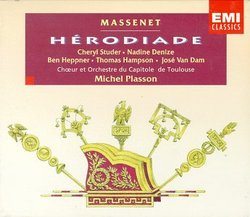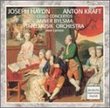| All Artists: Thomas Hampson, Jules Massenet, Michel Plasson, Cheryl Studer, Ben Heppner, Jean-Paul Fouchécourt, Jean-Philippe Courtis, Marcel Vanaud, Martine Olmeda, Nadine Denize Title: Massenet: Hérodiade Members Wishing: 0 Total Copies: 0 Label: Angel Records Release Date: 10/2/2001 Album Type: Box set Genre: Classical Style: Opera & Classical Vocal Number of Discs: 3 SwapaCD Credits: 3 UPC: 724355537829 |
Search - Thomas Hampson, Jules Massenet, Michel Plasson :: Massenet: Hérodiade
 | Thomas Hampson, Jules Massenet, Michel Plasson Massenet: Hérodiade Genre: Classical
Imagine a version of the Salome story in which everybody is nice. Don't laugh: That's what this is. Salome willingly sublimates her passion for St. John the Baptist and closes the opera with her noble suicide. Of the tw... more » |
Larger Image |
CD DetailsSynopsis
Amazon.com Imagine a version of the Salome story in which everybody is nice. Don't laugh: That's what this is. Salome willingly sublimates her passion for St. John the Baptist and closes the opera with her noble suicide. Of the two recent recordings of the opera (the other being under Gergiev), this is the nicer of the two and, for sticklers to French style, the more logical choice. The account of the score is more complete, with lots of ballet music that Francophiles will enjoy and others will find superfluous. Both orchestra and conductor are French. Other than Cheryl Studer (Salome), Ben Heppner (St. John), and Thomas Hampson (Herod)--all of whom sing extremely well--the cast is French and abounds with major voices (such as Jean-Paul Fouchecourt) in minor roles. But the price is an extra disc: This set has three, as opposed to Gergiev's two. Also, one must ask whether a second-tier Massenet opera (which means it's a tad innocuous) is deserving of all the respect that this recording gives. --David Patrick Stearns Similarly Requested CDs
|
CD ReviewsSo far, the most compelling performance of a masterpiece. Constantin Declercq | 06/19/1999 (5 out of 5 stars) "By the second half of the 19th Century, Massenet, along with Rimsky-Korsakov (in my opinion) joined the ranks with Wagner & Verdi as the foremost composers of operatic works. In France, Massenet was the most successful operatic composer & it has been decades since his death in 1912 that his operas were performed with regularities. By the second World War and two decades thereafter, most of French operas & operattas took the back seat in most repetoire and it was not until the early 1970s when French operas re-earned the interests they rightfully deserved.Herodiade was no exception. However, interest in this work did not occur until the 1990s: it was largely ignored during the 20th Century despite its' success at its' Monnaie, France premiere of 1882, which earned an additional 54 performances for the next two seasons.Peculiar! Herodiade is a type of opera which has significant roles singing artists may want not to resist temptations in performing. It's a work of excitement and passion and Massenet shared Tchaikovsky's neurotic psychological approach to the characters of their theatrical works. Their works are that of human emotions & their reactions to their happenings (plots) and just mere descriptions of sceneries. That add more excitement & dimensions to their operas and thus the complexities.Like Karl Goldmark's "Queen of Sheba", Verdi "Aida", Richard Strauss' "Salome", "Herodiade" deals with love, passion, desparation, defiance, & the struggle to overcome temptations to love, in setting where religion rules, and fundamentally so. One is torn between observing religious laws governing societies and breaking them in order to feel more fulfilled, as a more complete person with wants & needs. Can anyone not relate to that today? Massenet and Librettists Paul Milliet & Henri Gremont handle this human nature-like predicament effectively, with bold honesty & with nothing to lose. Herodiade, like the other operas mentioned above, has a message of what love can do to a person if it is not controlled. As for the performance. Cheryl Studer, who sang with power & conviction in Strauss' "Salome" with Sinopoli conducting the Staatskapelle Dresden, performed with the same level of power & conviction. In playing Salome in Strauss' opera & in Herodiade, Cheryl Studer bring out the human temptations and desparations out of her without exagerating Salome's personality. Nadine Denize played Herodiade effectively, as a woman torn between her husband Herode & her daughter Salome. Martine Olmieda played John the Baptist as the priest torn between Herode's (played evocatively by Ben Heppner) evil attempts to silence him & Salome's uncontrolable love for him. The rest of the cast played with upmost vividness & imagination. Michel Plasson & the Choeur et Orchestra du Capitole de Toulouse played with passion & urgency. Plasson directed the performance in a fast pace, but with excitement & upmost discipline embedded. Although I always prefer live recordings of operas, this recording will do.Recommended! You will not be disappointed." La référence Constantin Declercq | 12/13/2006 (5 out of 5 stars) "Trois versions d'«Hérodiade» se trouvent facilement : celle enregistrée en 1963 par Pathé et disponible dans le coffret «10 Opéras français» (57 minutes), celle de Radio-France de 1974 sortie en 1985 puis rééditée par Opera d'oro (deux heures et quart) et celle-ci enregistrée en 1995 (2h45). «Hérodiade», deuxième opéra de Massenet après «Le Roi de Lahore» et immense succès à l'époque, a la particularité d'avoir cinq rôles d'égale importance : Salomé, Hérode, Hérodiade, Phanuel et Jean ont donc chacun leurs grands airs et il est en général difficile de trouver un équilibre parmi les chanteurs. Cette version, enregistrée avec Michel Plasson, l'a assez bien trouvé grâce en particulier à José Van Dam qui chante Phanuel (et donc «Dors ô cité perverse»). Nadine Denize est de nouveau Hérodiade comme en 1974. Cheryl Studer est Salomé et s'en acquitte très bien (y compris en ce qui concerne le problème délicat de la diction). Ben Heppner est Jean, peut-être le moins bon des cinq. Par contre Thomas Hampson fait un excellent Hérode (et un très beau «Vision fugitive», mélodie où apparaissent pour la première fois les canons massenetiens). Enfin, Jean-Paul Fouchécourt est la voix qui chante le bref mais ô combien important «Schemah Israël» au fond du temple. Les choeurs sont superbes et on a bien sûr droit à toutes les danses de l'acte IV." Chaudement agréable Sam | Seahurst, Washington | 12/07/2007 (4 out of 5 stars) "Massenet's opera about Salome and John the Baptist, completed in 1880, has little in common with either the Bible story or the violent Strauss opera based on Oscar Wilde's play, and the final scene, so far from involving Salome in asking for John's head, has an ecstatic duet for them both, `hymning the chaste flame of their immortal love'--as the EMI synopsis graphically puts it. When John is executed, Salome then kills herself. What matters is that the opera offers five portly parts for well-contrasted voices.
Michel Plasson's studio recording offers well-balanced sound, sumptuous and confidently focused. His text is complete, using the final and fullest version of a work that Massenet revised several times. As Herodiade herself, Nadine Denize sings with gloriously rich, firm tone, and Thomas Hampson's portrait of Herode could hardly be richer either vocally or dramatically, with words brought out flamboyantly. It would be hard to imagine a finer Phanuel than Jose van Dam, with his well-contrasted bass-baritone incisive in attack. As for Cheryl Studer as Salome, she has rarely sung with such expressive range and beauty of tone, with words crystal-clear. Ben Heppner as Jean confirms in his clear, firmly focused delivery earlier impressions of his development as a genuine heroic tenor with few rivals today. There are first rate singers too in the small roles, and the Toulouse orchestra plays with glowing warmth and intensity, helped by the acoustic of Halle-aux-Grains. " |

 Track Listings (20) - Disc #1
Track Listings (20) - Disc #1


